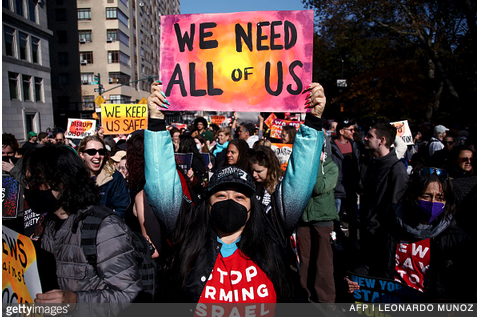You’re out. Now what?
by Vickie Aldous of the Mail Tribune Thursday, April 11th 2019
https://mailtribune.com/news/top-stories/life-after-prison-support-system-key-to-success
Former prison inmate Gelacio Ortiz-Reedy cuts a customer’s hair during barber school at Phagans’ Medford Beauty School. Jamie Lusch/Mail Tribune
Without the daily structure of prison life, Gelacio Ortiz-Reedy didn’t know what to do when he was released back to Jackson County.
“The first couple days, I was joyful to be out and just to walk around, but after those first couple days, it’s like, ‘OK, now what are you going to do? You’re walking around and you got your freedom — so what are you going to do with it?’ That was kind of an overwhelming time,” he says.
But Ortiz-Reedy had earned his GED and worked as a barber during the 13 months he spent in state prisons in Salem and north of Coos Bay.
That opened the door for him to enroll at Phagans’ Medford Beauty School with a goal of becoming a licensed barber. Because of his past history of drug and theft charges, the school, Ortiz-Reedy and his probation officer worked out a safety plan that focuses on communication and accountability.
Ortiz-Reedy says the school has become an integral part of his support system.
“Honestly, some of them can’t even believe that I’ve been in prison, because I’m just not that person anymore. But if it wasn’t for the people there and how understanding they are, I probably would have struggled a lot more. They really care about me there. And they’re like so glad that I’m there and they’ve really welcomed me with open arms at the school. Nobody’s ever looked down on me,” he says.
People released from prison and those who help them transition back to regular life say building a support system is the key to success.
Former prison inmates recommend building a support system in order to succeed.
In the past, prisoners were released with a garbage bag holding their belongings and a bus ticket, says Jackson County Community Justice Director Eric Guyer.
“We recognized that was a recipe for recidivism. That person didn’t have a great opportunity to be successful upon their release,” says Guyer.
Life in prison
Ortiz-Reedy says he was filled with guilt when he was sentenced to prison in 2017.
“I have children, so I was thinking, ‘My life is ruined. My kids aren’t going to know who I am anymore.’ I beat myself up a lot, like ‘How could you let this happen? How could you let it get so far?’ Because when you’re using drugs, you always think that at some point you could just stop and you could fix the problems. But when you get sentenced, that goes away,” he says.
Ortiz-Reedy says some men in prison acted like they had something to prove.
“If you think that you’re tougher than everyone else, you’re going to be in for a rude awakening,” he says.
Ortiz-Reedy says he focused on fitness, eating healthy and staying out of trouble. He fantasized about seeing his family again and asking for their forgiveness.
For Brandon Orr, getting arrested was a chance to break free from heroin and methamphetamine addiction. He remembers being awake for 30 days straight before landing in the Jackson County Jail.
“I couldn’t run anymore. I was done. I was tired. I was weak. I was beaten. I was broken,” he says. “When they said I wasn’t getting out, I started crying — and it wasn’t because I wasn’t getting out. It was because I’d finally had enough and I knew that I was going to prison. I knew that that’s what it was going to take to get me clean.”
After 13 months in state prison in Portland and more than a year of sobriety, Orr was terrified when he was released in April 2018. His life in Medford had revolved around getting high and stealing.
Orr was in Alba Park in downtown Medford praying desperately for help. He noticed a man wearing a gold chain, shorts and a flat-billed baseball hat staring at him. Did he owe the guy money? Had he wronged him in the past?
The man walked up to Orr and asked if he needed help.
Orr remembers telling him, “Look. I’ve just been released from prison and I’m not going to lie to you. I’m more scared than I’ve ever been in my life.”
Orr was in disbelief when the man introduced himself as Pastor Chris Gerlach and pointed out his nearby church, Family Christian Ministry.
“And he listened, and he didn’t say anything and he didn’t want anything,” Orr says. “He just wanted to know if I was OK and to let me know that I would be OK.”
Both Orr and Ortiz-Reedy have become friends with Gerlach and attend his storefront church, which is known for its street outreach and support for those struggling with addiction and incarceration.
“He was a stronghold from the very minute I met him,” Orr says of Gerlach. “He’s always been there.”
Ortiz-Reedy says the right church can be a key part of a person’s support system.
“If you’re struggling when you get out of prison, you need to voice it to the right people. Seek a church,” he advises. “Don’t just go because you need stuff. Go there and be involved.”
Building a community
Orr and Ortiz-Reedy say another crucial part of their support network is the worldwide system of Oxford Houses, where those in recovery live together in democratically run houses.
Ortiz-Reedy was released to the Jackson County Transition Center outside Talent. People recently released from prison and those serving alternative sentences live there while pursuing jobs and working for local businesses or on community justice work crews.
After two weeks at the Transition Center, Ortiz-Reedy secured a coveted spot in a local Oxford House.
“It’s given me a foothold,” he says.
Although the Transition Center helps people get on their feet, it can be a shock to those coming out of prison, says Nathan Beard. He worked for years as a staff member at the center before founding Nathan Beard Job Development, which helps those with criminal records land and keep jobs.
To survive in prison, most people treat others with respect and follow a code of conduct. Steal cake off a guy’s tray and you’ll get beaten up in the shower later, Beard says.
People who’ve served prison time are often annoyed and offended by the behavior of those coming off drugs who are in for short stays at the Transition Center, he says.
“So these people will come out and it’s like it blows their mind how disrespectful everyone seems and how loud the world is. Because they’re used to this little contained environment where all their decisions are made. They make no choices about what they do every day, except like if they want milk or water. They don’t get that many choices. And then all of a sudden, they have to make all of them when they get out — and deal with people that aren’t living the prison lifestyle, that aren’t following the ‘rules of engagement,’” Beard says.
Living in an Oxford House can be a haven, Orr says.
He co-chairs an Oxford House, has a peer support certificate and mentors others in recovery from addiction. He had never heard of peer mentors until a few years ago.
“I never had what they now call peer support — somebody that you can lean on, somebody that you can talk to, somebody that can get you the proper resources you need to better succeed,” Orr says.
Guyer, the Jackson County Community Justice director, says people who are struggling are inspired when they see certified peer mentors taking part in community activities, church, addiction support meetings and the workforce.
“When we ask people, ‘When did you think change was possible? When did you decide that you could go down a different path?’ They’ll often say, ‘When I saw that one person doing well,’” Guyer says.
A helping hand
Guyer says Jackson County probation workers are there to enforce probation terms, but they also help people involved with the criminal justice system access housing, transportation, employment training and more.
Newly released people often don’t have cars and are reliant on public transportation — which doesn’t always travel at the times and to the places they need to go. Many show great resilience by walking long distances, Guyer says.
Traveling by bus is also time-consuming, says Beard, who often drives his clients around himself so they can drop off resumes at more than a dozen businesses.
Ortiz-Reedy says one of the most important things his pastor has done for him is to drive him around to barber school, meetings with his probation officer and other locations as he rebuilds his life.
“If you wanted to help, all you need to do is donate some time to someone who is getting out and work with them and just care, you know,” Ortiz-Reedy says. “Be there at a certain time when they need to go somewhere. That really makes a difference. It really does.”
Donating hygiene supplies also can keep people on the straight and narrow, he says.
“In prison, they give you the bare necessities. And then when you get out, you don’t have those anymore,” Ortiz-Reedy says. “It can be difficult — especially if you are a drug addict or a criminal — to go without those things. Because they know how to get them. They can go back to their old ways, which is tempting. It is. Especially if you’ve done it a long time.”
For people who want to help those released from prison, Guyer recommends volunteering or making donations through a faith-based group, treatment organization or other nonprofit group.
“Lean on the expertise of these agencies about how to be safe,” he says.
Guyer and Beard say those with criminal records have to be strong and gracious in the face of rejection. They won’t always be treated respectfully or warmly by a prospective employer or the community at large.
Guyer says the whole community can help people become contributing members of society again by being supportive and welcoming.
“These people are our neighbors,” he says. “Once they’re released from prison, it’s in all of our best interests — in terms of the community we want to live in — to recognize the fact that these people are living beside us. They’re at the grocery store. These people are working in our community. They’re often the people that we see day in, day out.”
To those making the transition from prison back to the community, Orr recommends being open, honest and willing to change.
Above all, he says, believe in yourself — but don’t try to go it alone.
“If you’re going through something drastic in your life, and you don’t reach your hand out, nobody’s going to be there to grab it,” Orr says.
Reach Mail Tribune reporter Vickie Aldous at 541-776-4486 or valdous@rosebudmedia.com. Follow her at www.twitter.com/VickieAldous.


